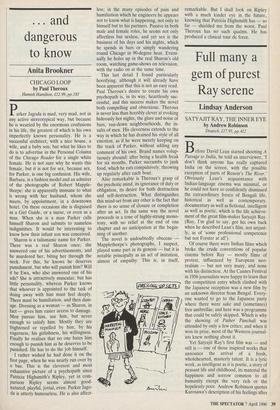. . . and dangerous to know
Anita Brookner
CHICAGO LOOP by Paul Theroux Hamish Hamilton, £12.99, pp.183 Parker Jagoda is mad, very mad, not in any active stereotypical way, but because he is wearied by the enormous confusions in his life, the greatest of which is his own imperfectly known personality. He is a successful architect, with a nice house, a wife, and a baby son, but what he likes to do is to advertise in the Personal Column of the Chicago Reader for a single white female. He is not sure why he wants this female, but it is not for sex, because sex, for Parker, is one big confusion. His wife, Barbara, is a fashion model and an admirer of the photographs of Robert Mapple- thorpe: she is apparently immune to what is wrong with her husband, whom she meets, by appointment, in a downtown hotel. On these occasions she is disguised as a Girl Guide, or a nurse, or even as a man. When she is a man Parker calls himself Sharon and submits to nameless indignitities. It would be interesting to know how their infant son was conceived.
Sharon is a talismanic name for Parker. There was a real Sharon once; she answered one of his advertisements, and he murdered her, biting her through the neck. For this, he knows he deserves punishment, but who will punish him? Will it be Ewa, who also answered one of his ads? She is attractively muscular, but has little personality, whereas Parker knows that whoever is appointed to the task of doing away with him must feel deeply. There must be humiliation, and then dam- age. Dressing as a woman — as Sharon, in fact — gives him easier access to damage. Men pursue him, use him, but never enough to satisfy him. Mostly they are frightened or repelled by him, by his eagerness, his girlishness, his willingness. Finally he realises that no one hates him enough to punish him as he deserves to be punished. He has to do the job himself.
I rather wished he had done it on the first page, when he was nearly run over by a bus. This is the cleverest and most exhaustive picture of a psychopath since Patricia Highsmith's Ripley, yet in com- parison Ripley seems almost good- natured, playful, jovial, even. Parker Jago- da is utterly humourless. He is also affect- less; in the many episodes of pain and humiliation which he engineers he appears not to know what is happening, not only to himself but to his partners. Passive in both male and female roles, he seems not only affectless but sexless, and yet sex is the business of his days and his nights, which he spends in bars or simply wandering round Chicago in 90-degree heat. Event- ually he holes up in the real Sharon's old room, watching game-shows on television, with the radio on at the same time.
This last detail I found particularly horrifying, although it will already have been apparent that this is not an easy read. Paul Theroux's desire to create his own psychopath is, in its way, heartlessly suc- cessful, and this success makes the novel both compelling and obnoxious. Theroux is never less than horribly clever at evoking hideously hot nights, the glare and noise of bars, run-down neighbourhoods, the in- sults of men. His cleverness extends to the way in which he has drained his style of all emotion, as if he were merely keeping on the track of Parker, without adding any comment of his own. Brand names volup- tuously abound: after being a health freak for six months, Parker succumbs to junk food, which he eats compulsively, throwing up regularly after each bout. Also remarkable is Theroux's grasp of the psychotic mind, its ignorance of duty or obligation, its desire for both destruction and self-destruction. What distinguishes this mind-set from any other is the fact that there is no sense of closure or completion after an act. In the same way the novel proceeds in a tone of highly-strung mono- tony, with no relief at the end of one chapter and no anticipation at the begin- ning of another. The novel is undoubtedly obscene — Mapplethorpe's photographs, I suspect, played some part in its genesis — but it is notable principally as an act of imitation, almost of empathy. This is, in itself, remarkable. But I shall look on Ripley with a much kinder eye in. the future, knowing that Patricia Highsmith has — so far — shielded me from the worst. Paul Theroux has no such qualms. He has produced a clinical tour de force.


























































 Previous page
Previous page